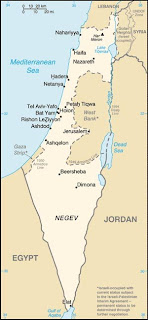The cost is now so high and the likelihood of a satisfactory outcome so low, that it time to say that if sustaining Israel as an independent democratic nation in the Middle East is a “cause, “ then it is time to catch our breath and prepare ourselves to do whatever it takes. If it an “interest,” it is time to look more closely at the cost-benefit analysis. What do we get from continuing to do what we have been doing?
The U. S. government has not yet made either case. The American Israel Public Affairs Committee (AIPAC) has, of course, made both cases, but as the time drags on and the costs rise, this is a case we need to hear from the President. President Obama, so far, has done what all of his predecessors, reaching back in my memory to Truman, have done. He has invested a substantial part of our foreign aid budget in Israel’s ability to defend itself and he has invested a substantial part of his diplomatic attention in a “peace process.” The peace process is the most important part because it is the only thing that prevents some judgment from being made about what our interests are and what to do to further them. The "peace process" is a political snooze button.
Let’s look at the situation, then at the options.
Israel now has secure borders. “Borders,” of course, do not project the civilian population from rockets lobbed into Israel from Gaza; they do prevent any foreseeable land invasion. But Israel is not secure and will never be secure so long as there are neighbors—and I am not talking just about the governments of the neighboring states—capable of attacking Israel. The attackers will call them “reprisals,” of course, but the conflict has gone on so long that anything done by either side can now justly be called a “reprisal.”

But “Israel,”—I’ll come in a minute to why that word is in italics—wants two things it is not likely to get and at the moment, feels that the current level of conflict is preferable to giving them up. One is complete control of the entire city of Jerusalem, including the Muslim part. The second is a continually expanding eastern frontier, so more and more of Palestine comes under the control of the government of Israel. This second goal is probably not going to be acceptable either, but it has, in addition a “poison pill” provision. If Israel simply annexed the West Bank, a majority of her “residents” would not be Jews and the prospect would loom of a free and fair election putting in place a Muslim government. I call it a “prospect” only because that is where the population numbers lead and that is where the comparative birth rates lead as well.
Now are these two things "what Israel demands?" Yes and no. That is why I put “Israel” in quotes above. Israel currently has a conservative government. The coalition Benjamin Netanyahu leads is a majority because it has a number of far right parties included in it. They can pull the plug on his government any time they want to and they have not been shy about reminding him of that. A move to deal with Jerusalem by dividing it or sharing it or internationalizing it would bring about the end of Prime Minister Netanyahu’s government. Similarly, an Israeli commitment to forbid further settlement in the West Bank—these settlements are in a foreign country—much less to dismantle the settlements already built there, would also bring about an end of his government. So it doesn’t really matter whether these are things he wants to do. He couldn’t do them even if he did want to.
Similarly “Palestine,” (again, note the quotes) can neither recognize Israel diplomatically nor prevent attacks on Israel from its territory. Hamas is the legitimate government of Gaza, but it doesn’t control the ability of militants to attack Israel from Gaza. This is true, again, even if they wanted to and their desire to do so comes and goes. Mahmoud Abbas and his Fatah party control the West Bank, but he is powerless to make “peace process commitments” as well. He cannot prevent Israel from continuing to take land in the West Bank and he cannot prevent militants from attacking Israel from the West Bank.
It is for this collection of reasons that I say the process has no foreseeable end. Any step toward peace will remove from authority the leader who takes that step. Should normal political processes prove inadequate, there is always assassination, which has proved effective in the past. So things are going to keep going the way they are going.
That means that the President needs to decide how long he is going to support this process. I will pass over the domestic political attractions to remaining “a friend of Israel.” If supporting Israel—at the moment, that means supporting Israeli practices that Jimmy Carter called “apartheid,”—is a moral commitment, then we need to prepare our citizens to continue paying the price. The price in American lives and American dollars continues to escalate. It is now so far out of hand that Defense Secretary Robert Gates and Chairman of the Joint Chiefs of Staff, Mike Mullen, are talking about it in public. Those remarks are really important if we are looking at our relationship with Israel in a cost-benefit framework. Otherwise, not so much.
Either way, President Obama needs to say what is going to happen and how we are going to participate in it and why and for how long. He has not said any of those things and I have been listening really hard.
No comments:
Post a Comment